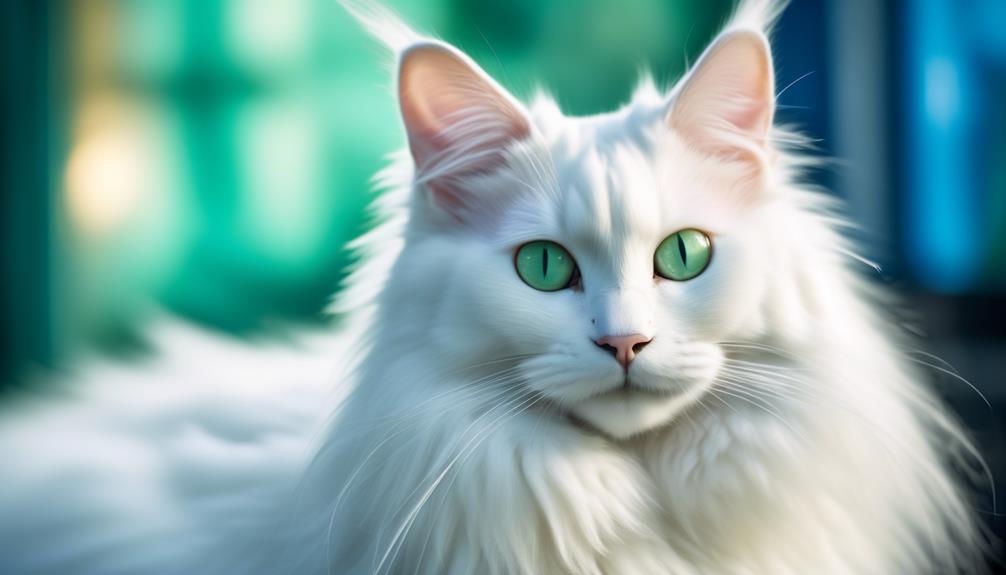
The Turkish Angora cat breed has captivated cat enthusiasts for centuries with its striking beauty and charming personality.
Originating from Turkey, this medium-sized breed has a lot to offer.
From its luxurious and silky coat in various colors and patterns to its highly affectionate and playful nature, the Turkish Angora is a breed that will steal your heart. But there is more to this breed than meets the eye.
With its intelligence, athleticism, and vocal nature, plenty of intriguing characteristics exist.
However, it’s important also to consider the health and genetic conditions that can affect this breed and the responsible adoption and breeding considerations.
So, if you’re curious to uncover all the fascinating details about the Turkish Angora cat breed, join us on this journey of discovery.
Key Takeaways
- Turkish Angora cats have an intelligent, playful, and affectionate temperament, making them highly interactive and entertaining companions.
- They are pleasant and friendly towards their family and guests and thrive in a home with another cat or dog for company.
- While generally a healthy breed, Turkish Angoras are prone to certain health conditions such as deafness, ataxia, and hypertrophic cardiomyopathy.
- When adopting a Turkish Angora, prioritize rescue organizations or reputable breeders who prioritize health, temperament, and ethical practices. Regular grooming, dental care, and a clean litter box are important for their care.
Origin and Size
The Turkish Angora cat, a medium-sized breed from Turkey, is known for its elegant appearance and charming personality.
These cats have a graceful and slender bodies with an average weight of 5 to 9 pounds.
With their long, fine, and silky coats, Turkish Angoras come in various colors and patterns, adding to their aesthetic appeal.
They have a wedge-shaped head with large ears and almond-shaped eyes, giving them a distinctive and captivating look.
In addition to their physical beauty, Turkish Angoras are highly intelligent and playful, making them engaging companions.
Their affectionate and interactive nature, combined with their vocal communication skills, make them a delight.
See another cat breed profile.
Turkish Van
Coat and Shedding
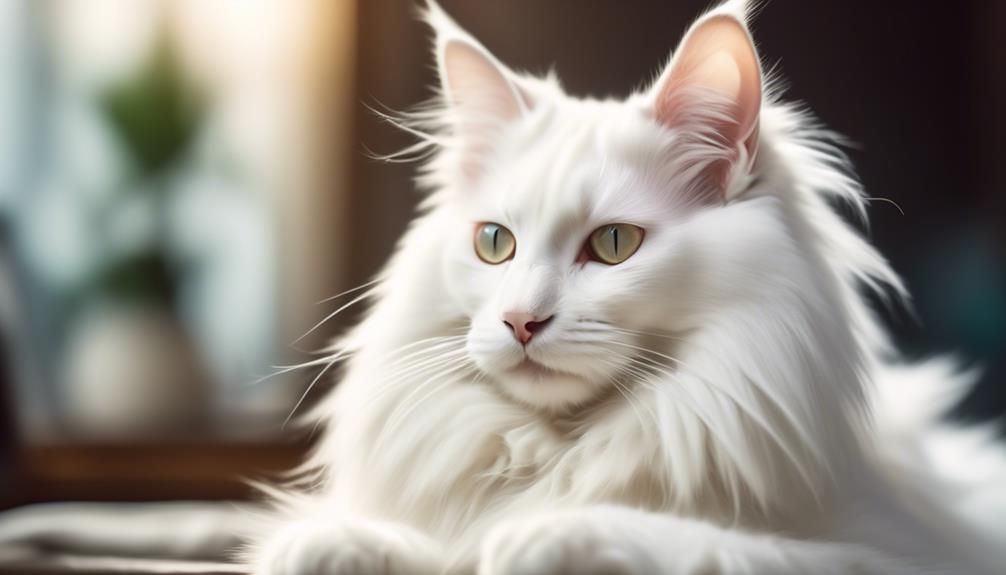
With their long, fine, and silky coats, Turkish Angora cats possess a stunning aesthetic quality further enhanced by minimal shedding.
This breed’s coat requires regular grooming, but the effort is well worth it for its luxurious appearance.
Here are some key points about the Turkish Angora’s coat and shedding:
- The Turkish Angora has a single coat with a silky texture, which adds to its elegance.
- These cats have a long, fine, and silky coat in various colors and patterns.
- Turkish Angoras shed very little despite their long hair compared to other breeds.
- Their minimal shedding makes them a great choice for individuals who prefer a clean and low-maintenance environment.
- Regular grooming, such as weekly combing or brushing, helps keep their coat healthy and tangle-free.
Temperament and Personality
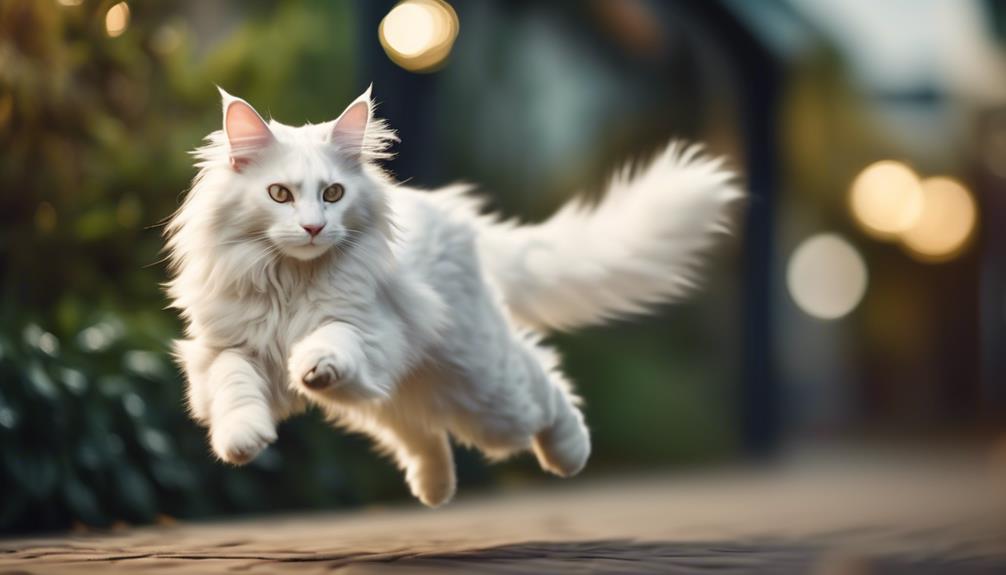
Turkish Angora cats are known for their intelligent and playful temperament, making them an engaging and entertaining companion.
These cats are highly interactive and enjoy playing with their owners, often engaging in games of fetch or chasing toys.
They are affectionate towards their family and want to be involved in their daily activities.
Turkish Angoras are also vocally communicative, often expressing their needs and desires through various vocalizations.
With their athletic and active nature, they are clever and endlessly entertaining, keeping their owners on their toes. Despite their playful nature, Turkish Angoras are friendly towards guests and enjoy socializing.
However, due to their friendly nature, they are best suited to a home with another cat or dog for company.
Health and Genetic Conditions
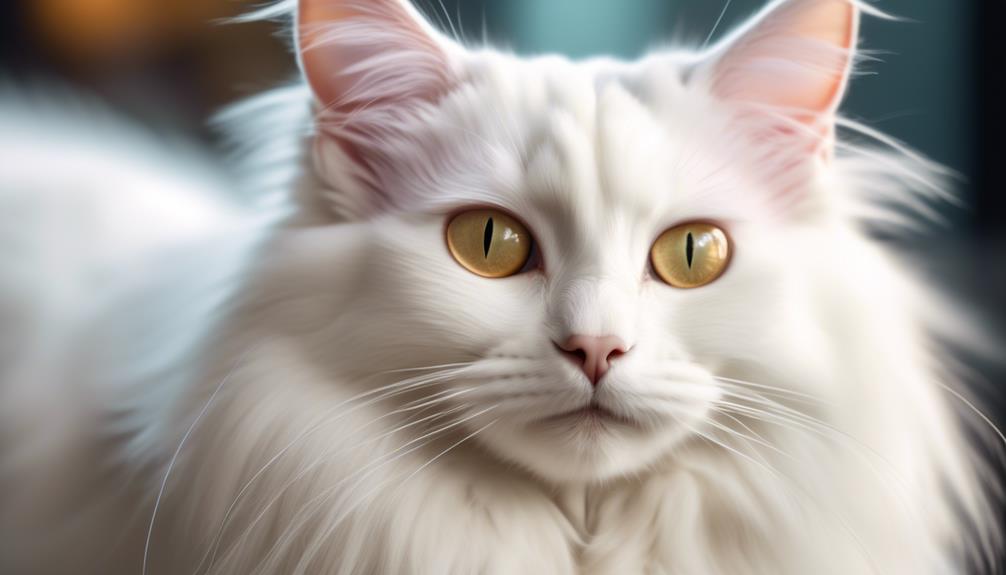
Health and genetic conditions are important considerations when owning a Turkish Angora cat.
While the breed is generally healthy, there are certain health issues that they may be prone to.
Common Health Issues:
- Deafness: Solid white cats with one or two blue eyes may be at risk for deafness.
- Ataxia: This neurological condition affects coordination in muscle movements.
- Hypertrophic Cardiomyopathy (HCM): The most common heart disease in cats involves the thickening of the heart muscles.
Factors to Note:
- Poor breeding practices can increase the risk of genetic health problems.
- Regular health screenings and responsible breeding practices should be prioritized.
Adoption and Breeding Considerations
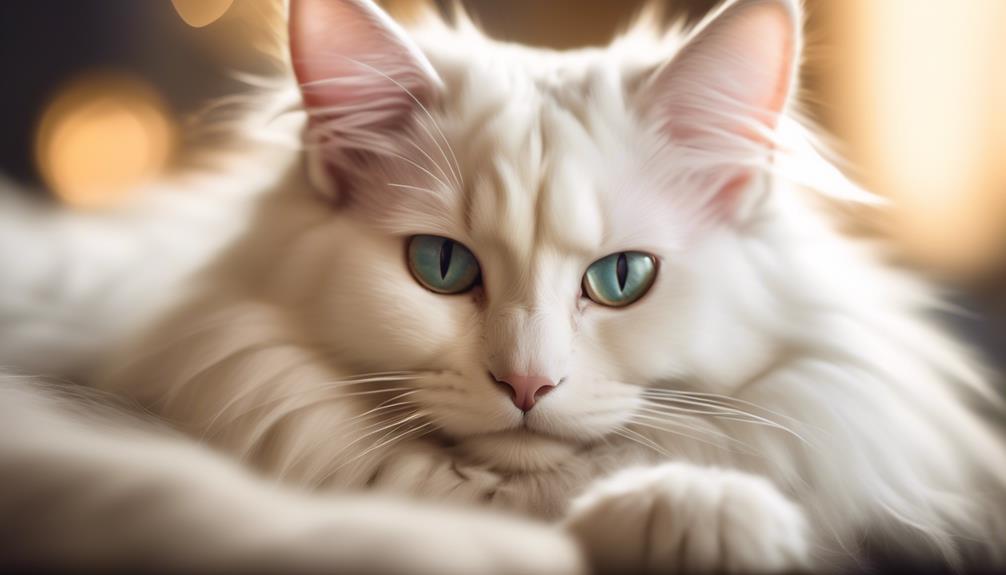
When considering adopting or breeding a Turkish Angora cat, it is essential to prioritize ethical practices and the welfare of the cats involved.
Adopting rescue organizations or shelters is often the best option, giving a deserving cat a loving home.
However, if purchasing a Turkish Angora kitten, it is important to choose a reputable breeder who prioritizes the health and well-being of their cats.
Researching the breeder’s ethical practices and cat welfare priorities is crucial. Reputable breeders should prioritize the health and temperament of their cats and provide a nurturing environment for them.
It is also important for breeders to conduct necessary health screenings for the kittens to ensure they are free from genetic health problems.
| Adoption Considerations | Breeding Considerations |
|---|---|
| Prioritize rescue organizations or shelters | Choose a reputable breeder |
| Research ethical practices and cat welfare | Ensure the breeder prioritizes health and temperament |
| Consider the cat’s health and background | Provide a nurturing environment |
| Provide a loving and forever home | Conduct necessary health screenings |
| Be prepared for the responsibilities of cat ownership | Avoid poor breeding practices |
Care and Grooming Requirements
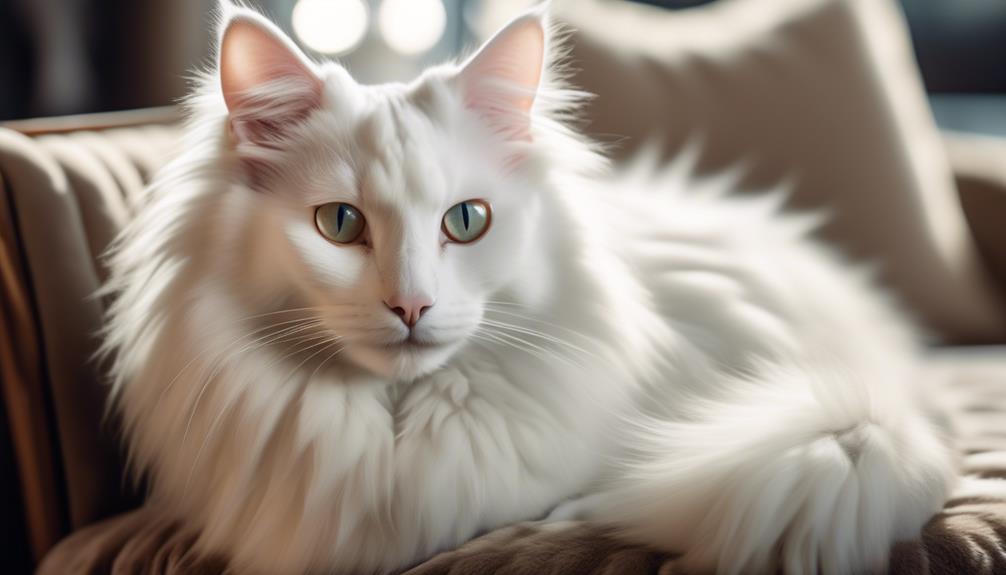
To properly care for a Turkish Angora cat, it is important to understand their specific grooming requirements.
Turkish Angoras have a long, fine, silky coat that requires regular maintenance to keep it in good condition.
Here are some key grooming tips for this breed:
- Brush their coat at least once weekly to remove tangles or mats.
- Pay special attention to their undercoat, as it tends to be dense and prone to matting.
- Trim their nails regularly to prevent them from becoming too long and causing discomfort.
- Clean their ears regularly to avoid wax buildup and potential infections.
- Brush their teeth regularly to maintain good oral hygiene and prevent periodontal disease.
Frequently Asked Questions
Are Turkish Angora Cats Hypoallergenic?
Turkish Angora cats are not inherently hypoallergenic. While they produce fewer allergenic proteins, individual reactions may still occur.
Spending time with the breed is recommended to determine personal sensitivity before adopting.
How Often Should Turkish Angora Cats Be Taken to the Vet for Check-Ups?
Turkish Angora cats should be taken to the vet for regular check-ups at least once a year.
However, it is advisable to consult with your veterinarian for a personalized schedule based on the cat’s age, health, and specific needs.
Can Turkish Angora Cats Be Trained to Do Tricks?
Yes, Turkish Angora cats can be trained to do tricks.
They are intelligent, playful, and highly interactive, making them receptive to training.
They can learn various tricks and commands with patience, positive reinforcement, and consistent practice.
Are Turkish Angora Cats Good With Children?
Turkish Angora cats are generally good with children.
They are affectionate, playful, and sociable, making them great companions for kids.
However, it’s important to supervise interactions and teach children how to handle cats gently and respectfully.
Do Turkish Angora Cats Require a Lot of Exercise?
Turkish Angora cats are an active and athletic breed, requiring regular exercise to keep them healthy and entertained.
They enjoy interactive play sessions and benefit from having plenty of toys and climbing structures to stimulate their instincts.
Conclusion
In conclusion, the Turkish Angora is a sociable and beautiful breed that makes a wonderful companion.
With their long, silky coat and playful personality, they bring endless entertainment to their families.
While they may be prone to certain health conditions, adopting from reputable sources can help ensure a healthy, well-tempered cat.
With regular grooming and care, the Turkish Angora can thrive in any household and provide years of love and joy.




